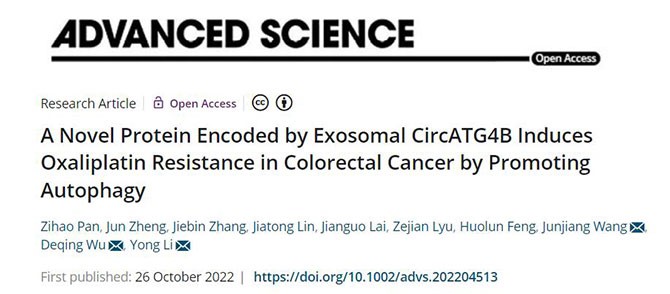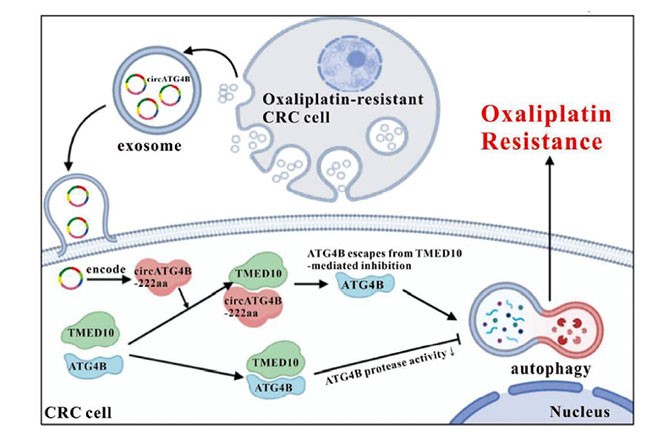

Professor Li Yong from the Department of Gastrointestinal Surgery, also Vice Director of our hospital, has led his team to make a significant breakthrough in research on the mechanism of resistance to oxaliplatin in colorectal cancer. The research findings have been published in the internationally famous journal “Advanced Science” (IF=17.521), revealing for the first time that exosomal circATG4B participates in reducing the chemotherapy sensitivity of colorectal cancer cells, providing a new theoretical basis for potential therapeutic targets for overcoming resistance to oxaliplatin in colorectal cancer.
Colorectal cancer is one of the most common malignancies and is the second leading cause of cancer-related death worldwide. The development of treatment techniques has improved the prognosis of colorectal cancer patients, but the overall survival rate remains unsatisfactory. Oxaliplatin, as a third-generation platinum compound that suppresses genetic transcription and DNA synthesis, is often used in chemotherapy regimens after colorectal cancer surgery. However, cancer cells will eventually develop drug resistance. Earlier studies found that acquired chemotherapy resistance severely affects the efficacy in colorectal cancer patients, but its mechanism remains unclear.

Focusing on this key clinical problem, the team led by Li Yong and Pan Zihao has published a research paper titled “A Novel Protein Encoded by Exosomal CircATG4B Induces Oxaliplatin Resistance in Colorectal Cancer by Promoting Autophagy” in the “Advanced Science”, clearly demonstrating the formation path of the chemotherapy mechanism in colorectal cancer. Guangdong Provincial People's Hospital is the first unit to complete the full text, Dr. Pan Zihao from the Department of Gastrointestinal Surgery is the first author, Professor Li Yong is the corresponding author, and Professor Wang Junjiang and Professor Wu Deqing are co-corresponding authors. (Note: Dr. Pan Zihao was selected as a 2021 Outstanding Young Talent of our hospital.)
More and more evidence shows that the vesicle exosomes with a diameter of 100-300nm secreted by cancer cells can transfer oncogenic molecules (including non-coding RNA(ncRNAs) and proteins) to target to cells participating in tumor invasion, proliferation, immune escape, and drug resistance. Circular RNA (circRNA) is a special kind of endogenous ncRNA that plays an important role in the progression of diseases. It features that the 5′ splice site and 3′ splice site of the upstream exon or intron link each other to form a circular structure. Acting as miRNA sponge is the most frequently reported function of circRNA. Moreover, circRNA can bind with target proteins and adjust their biological behavior.
Unlike linear RNA, it was thought in the past that circRNA is untranslatable because it lacks conventional essential elements for translation, such as 5’cap and poly (A) tail. However, several recent studies reported that circRNA can actually encode protein. In addition, exosomes are rich in circRNA which is important for intercellular communication. Previous studies have shown that exosomal circRNA plays an important role in mediating biological behavior. Because exosomes are rich in various circRNA, further study is required on the functions and potential mechanisms of cancer-derived exosomal circRNA in chemotherapy resistance in colorectal cancer.

In this study, the researchers found for the first time that the level of a novel circRNA (circATG4B, circ_0 007159) derived from ATG4B has increased in exosomes secreted by drug-resistant colorectal cancer cells. Exosomal circATG4B induces autophagy and chemotherapy resistance by encoding a novel protein (circATG4B-222aa). In terms of mechanism, circATG4B-222aa can act as a bait to competitively interact with TMED10 and prevent the inhibition of TMED10 on ATG4B function, which leads to increased autophagy, and thus inducing chemotherapy resistance. Therefore, this study revealed that exosomal circATG4B can reduce the chemotherapy sensitivity of colorectal cancer cells, providing a new theoretical basis for the treatment of colorectal cancer under chemotherapy resistance.
Department of Gastrointestinal Surgery